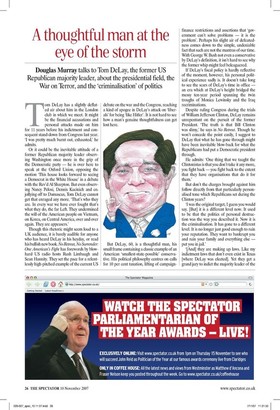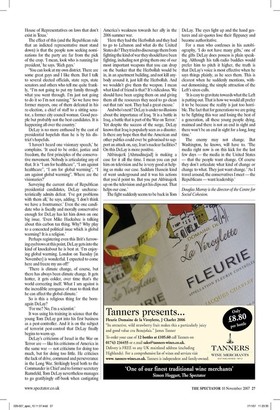A thoughtful man at the eye of the storm
Douglas Murray talks to Tom DeLay, the former US Republican majority leader, about the presidential field, the War on Terror, and the `criminalisation' of politics Tom DeLay has a slightly deflated air about him in the London club in which we meet. It might be the financial accusations and personal attacks made on him for 11 years before his indictment and consequent stand-down from Congress last year. 'I was pretty much burnt out, exhausted,' he admits.
Or it could be the inevitable attitude of a former Republican majority leader observing Washington once more in the grip of the Democratic party — he is over here to speak at the Oxford Union, opposing the motion 'This house looks forward to seeing a Democrat in the White House' in a debate with the Rev'd Al Sharpton. But even observing Nancy Pelosi, Dennis Kucinich and co. jollying off to Damascus, Tom DeLay cannot get that enraged any more. 'That's who they are. In every war we have ever fought that's what they do, the far Left. They undermined the will of the American people on Vietnam, on Korea, on Central America, over and over again. They are appeasers.'
Though this rhetoric might seem loud to a UK audience, it is barely audible for anyone who has heard DeLay in his heyday, or read his bullish new book. No Retreat, No Surrender: One American's Fight has forewords by blowhard US radio hosts Rush Limbaugh and Sean Hannity. They set the pace for a relentlessly high-pitched example of the current US debate on the war and the Congress, reaching a kind of apogee in DeLay's attack on 'liberals' for being 'like Hitler'. It is not hard to see how a man's genuine thoughtfulness can get lost here.
But DeLay, 60, is a thoughtful man, his small frame containing a classic example of an American 'smallest-state-possible' conservative. His political philosophy centres on calls for 10 per cent taxation, lifting of campaignfinance restrictions and assertions that 'government can't solve problems — it is the problem'. Perhaps his slight air of defeatedness comes down to the simple, undeniable fact that such are not the mantras of our time. With George W. Bush not even a conservative by DeLay's definition, it isn't hard to see why the former whip might feel beleaguered.
If DeLay's fiscal policy is hardly reflective of the moment, however, his personal political experience sadly is. It doesn't take long to see the scars of DeLay's time in office — an era which at DeLay's height bridged the messy ten-year period spanning the twin troughs of Monica Lewinsky and the Iraq recriminations.
Despite ruling Congress during the trials of William Jefferson Clinton, DeLay remains unrepentant on the pursuit of the former President. 'The truth is that Bill Clinton was slimy,' he says in No Retreat. Though he won't concede the point easily, I suggest to DeLay that what he has gone through might have been inevitable blow-back for what the Republicans had put a Democratic president through.
He admits: 'One thing that we taught the Clintonistas is that you don't take it any more, you fight back — you fight back to the extent that they have organisations that do it for them.'
But don't the charges brought against him follow directly from that particularly personalised tone which Republicans set during the Clinton years?
'I was the original target, I guess you would say. [But] it is a different level now. It used to be that the politics of personal destruction was the way you described it. Now it is the criminalisation. It has gone to a different level. It is no longer just good enough to ruin your reputation. They want to bankrupt you and ruin your family and everything else — put you in jail.'
'[And] they are making up laws. Like my indictment laws that don't even exist in Texas [where DeLay was elected]. Yet they get a grand jury to indict the majority leader of the House of Representatives on laws that don't exist in Texas.'
The effect of this (and the Republican rule that an indicted representative must stand down) is that the people now seeking nominations for the party are far from the pick of the crop. 'I mean, look who is running for president,' he says. 'Rich guys.'
'You can look at my own district. There are some great guys and I like them. But I talk to several elected officials, state reps, state senators and others who tell me quite frankly, "I'm not going to put my family through what you went through. I'm just not going to do it so I'm not running." So we have two former mayors, one of them defeated in his re-election, a chief of staff to a sitting senator, a former city council woman. Good people but probably not the best candidates. It is happening all over the country.'
DeLay is no more enthused by the cast of presidential hopefuls than he is by his district's hopefuls.
'I haven't heard one visionary speech,' he complains. 'It used to be order, justice and freedom, the first principles of the conservative movement. Nobody is articulating any of that. It is "I am for healthcare", "I am against healthcare", "I am for global warming", "I am against global warming". Where are the visionaries?'
Surveying the current slate of Republican presidential candidates, DeLay uncharacteristically admits defeat. 'I've got problems with them all,' he says, adding, 'I don't think we have a frontrunner.' Even the one candidate who is fiscally and morally conservative enough for DeLay has let him down on one big issue. 'Even Mike Huckabee is talking about this carbon tax thing. Why? Why play to a concocted political issue which is global warming? It is a religion.'
Perhaps registering even this Brit's furrowing eyebrows at this point, DeLay gets into the kind of knockabout he is best at. `I'm enjoying global warming. London on Tuesday [in November] is wonderful. I expected to come here and freeze my ass off!'
'There is climate change, of course, but there has always been climate change. It gets hotter, it gets colder, over time that's the world correcting itself. What I am against is the incredible arrogance of man to think that he can affect the global climate.'
So is this a religious thing for the bornagain DeLay?
'For me? No, I'm a scientist.'
It was using his training in science that the young Tom DeLay got into his first business as a pest-controller. And it is on the subject of terrorist pest-control that DeLay finally begins to warm up.
DeLay's criticisms of Israel in the War on Terror are — like his criticisms of America in the same war — not criticisms for doing too much, but for doing too little. He criticises the lack of drive, command and perseverance in the Long War. Strikingly loyal both to the Commander in Chief and to former secretary Rumsfeld, Tom DeLay nevertheless manages to go gratifyingly off-book when castigating America's weakness towards her ally in the 2006 summer war.
'Here they had the Hezbollah and they had to go to Lebanon and what do the United States do? They tried to discourage them from fighting the kind of war they should have been fighting, including not giving them one of our most important weapons that you can drop on the bunker that the Hezbollah would be in, in an apartment building, and not kill anybody around it, just kill the Hezbollah. And we wouldn't give them the weapon. I mean what kind of friend is that? It's ridiculous. We should have been urging them on and giving them all the resources they need to go clean out that rats' nest. They had a great excuse.'
And who's next? DeLay is under no illusions about the importance of Iraq. 'It is a battle in Iraq, a battle that is part of the War on Terror.' Yet despite the success of the surge, DeLay knows that Iraq is popularly seen as a disaster. Is there any hope then that the American and other publics could ever be galvanised to support an attack on, say, Iran's nuclear facilities? On this DeLay is more positive.
Ahbinajerk [Ahmadinej ad] is making a case for it all the time. I mean you can put him on television and he is very good at helping us make our case. Saddam Hussein kind of went underground and it was his actions that you'd point to. But you put Ahbinajerk up on the television and get his clips out. That helps our case.'
The fight suddenly seems to be back in Tom DeLay. The eyes light up and the hand gestures and air-quotes lose their flippancy and become authoritative.
For a man who confesses in his autobiography, 'I do not have many gifts,' one of the gifts DeLay does possess is plain speaking. Although his talk-radio buddies would prefer him to pitch it higher, the truth is that DeLay's voice is most effective when he says things plainly, as he sees them. This is clearest when he suddenly mentions, without demonising, the simple attraction of the Left's siren-calls.
'It is easy to gravitate towards what the Left is putting out. That is how we would all prefer it to be because the reality is just too horrible. The fact that for generations we are going to be fighting this war and losing the best of a generation, all these young people dying, maimed and there is not an end in sight and there won't be an end in sight for a long, long time.'
The enemy may not change. But Washington, he knows, will have to. 'The media right now is on this kick for the last few days — the media in the United States — that the people want change. Of course they don't articulate what kind of change or change to what. They just want change.' 'As I travel around, the conservatives I meet — the Republicans — want leadership.'
Douglas Murray is the director of the Centre for Social Cohesion.






































































 Previous page
Previous page